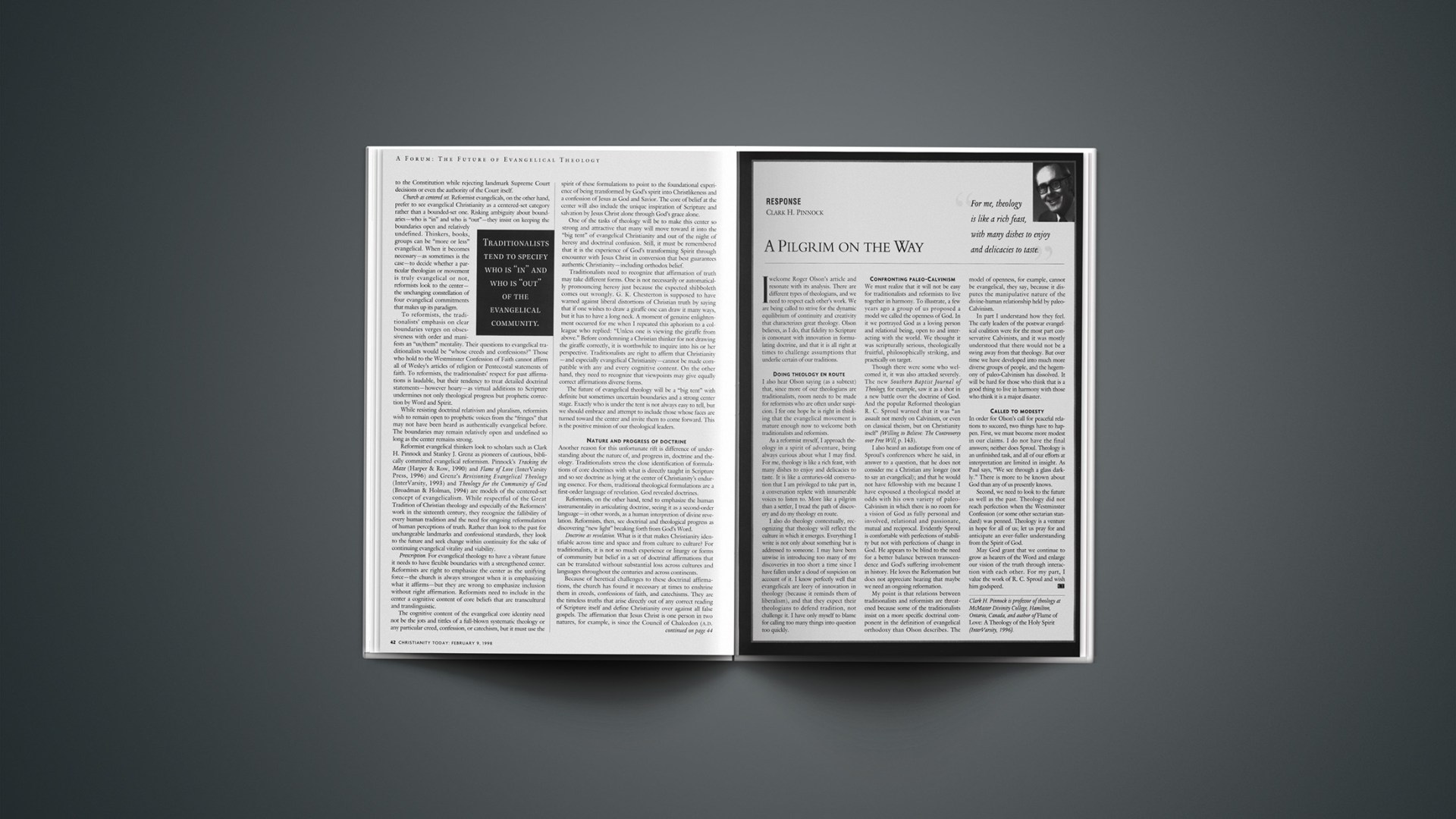I welcome Roger Olson’s article and resonate with its analysis. There are different types of theologians, and we need to respect each other’s work. We are being called to strive for the dynamic equilibrium of continuity and creativity that characterizes great theology. Olson believes, as I do, that fidelity to Scripture is consonant with innovation in formulating doctrine, and that it is all right at times to challenge assumptions that underlie certain of our traditions.
DOING THEOLOGY EN ROUTE I also hear Olson saying (as a subtext) that, since more of our theologians are traditionalists, room needs to be made for reformists who are often under suspicion. I for one hope he is right in thinking that the evangelical movement is mature enough now to welcome both traditionalists and reformists.
As a reformist myself, I approach theology in a spirit of adventure, being always curious about what I may find. For me, theology is like a rich feast, with many dishes to enjoy and delicacies to taste. It is like a centuries-old conversation that I am privileged to take part in, a conversation replete with innumerable voices to listen to. More like a pilgrim than a settler, I tread the path of discovery and do my theology en route.
I also do theology contextually, recognizing that theology will reflect the culture in which it emerges. Everything I write is not only about something but is addressed to someone. I may have been unwise in introducing too many of my discoveries in too short a time since I have fallen under a cloud of suspicion on account of it. I know perfectly well that evangelicals are leery of innovation in theology (because it reminds them of liberalism), and that they expect their theologians to defend tradition, not challenge it. I have only myself to blame for calling too many things into question too quickly.
CONFRONTING PALEO-CALVINISM We must realize that it will not be easy for traditionalists and reformists to live together in harmony. To illustrate, a few years ago a group of us proposed a model we called the openness of God. In it we portrayed God as a loving person and relational being, open to and interacting with the world. We thought it was scripturally serious, theologically fruitful, philosophically striking, and practically on target.
Though there were some who welcomed it, it was also attacked severely. The new Southern Baptist Journal of Theology, for example, saw it as a shot in a new battle over the doctrine of God. And the popular Reformed theologian R. C. Sproul warned that it was “an assault not merely on Calvinism, or even on classical theism, but on Christianity itself” (Willing to Believe: The Controversy over Free Will, p. 143).
I also heard an audiotape from one of Sproul’s conferences where he said, in answer to a question, that he does not consider me a Christian any longer (not to say an evangelical); and that he would not have fellowship with me because I have espoused a theological model at odds with his own variety of paleo-Calvinism in which there is no room for a vision of God as fully personal and involved, relational and passionate, mutual and reciprocal. Evidently Sproul is comfortable with perfections of stability but not with perfections of change in God. He appears to be blind to the need for a better balance between transcendence and God’s suffering involvement in history. He loves the Reformation but does not appreciate hearing that maybe we need an ongoing reformation.
My point is that relations between traditionalists and reformists are threatened because some of the traditionalists insist on a more specific doctrinal component in the definition of evangelical orthodoxy than Olson describes. The model of openness, for example, cannot be evangelical, they say, because it disputes the manipulative nature of the divine-human relationship held by paleo-Calvinism.
In part I understand how they feel. The early leaders of the postwar evangelical coalition were for the most part conservative Calvinists, and it was mostly understood that there would not be a swing away from that theology. But over time we have developed into much more diverse groups of people, and the hegemony of paleo-Calvinism has dissolved. It will be hard for those who think that is a good thing to live in harmony with those who think it is a major disaster.
CALLED TO MODESTY In order for Olson’s call for peaceful relations to succeed, two things have to happen. First, we must become more modest in our claims. I do not have the final answers; neither does Sproul. Theology is an unfinished task, and all of our efforts at interpretation are limited in insight. As Paul says, “We see through a glass darkly.” There is more to be known about God than any of us presently knows.
Second, we need to look to the future as well as the past. Theology did not reach perfection when the Westminster Confession (or some other sectarian standard) was penned. Theology is a venture in hope for all of us; let us pray for and anticipate an ever-fuller understanding from the Spirit of God.
May God grant that we continue to grow as hearers of the Word and enlarge our vision of the truth through interaction with each other. For my part, I value the work of R. C. Sproul and wish him godspeed.
Clark H. Pinnock is professor of theology at McMaster Divinity College, Hamilton, Ontario, Canada, and author of Flame of Love: A Theology of the Holy Spirit (InterVarsity, 1996).
Copyright © 1998 Christianity Today. Click for reprint information.










